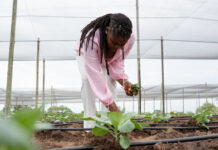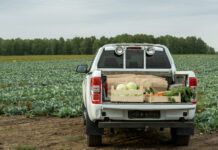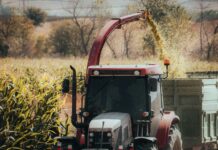World Food Day is celebrated annually on October 16 to commemorate the founding of the United Nations Food and Agriculture Organization [FAO] in 1945. The “Right to foods for a better life and a better future” is the theme for 2024. As the disastrous effects of climate change on crop yields and the agricultural sector become more apparent, the vital issue of food security and unfettered hunger in southern Africa is in the spotlight.
The Western Cape Department of Agriculture’s World Food Day campaign runs concurrently with National Nutrition Week in South Africa (9 – 15 October) and the World Food Forum (14 – 18 October) at the headquarters of the FAO in Rome, Italy.
On Friday 11 October a delegation from the Western Cape Government and members of ProVeg South Africa visited the town of Uniondale, in a provincial region heavily reliant on agriculture yet chronically susceptible to droughts, to address vital food security problems and nutritional deficits within that area. Dignitaries performed school site visits, including to local community food gardens, Dirk Boshoff primary school, Avontuur primary and Haarlem secondary school. Representatives from ProVeg distributed 2000 educational booklets concerning healthy nutrition to young learners. Hundreds of local residents attended the main event at the Uniondale Sports Grounds and were formally addressed by Dr. Ivan Meyer (Minister of Agriculture, Economic Development and Tourism in the Western Cape) Dr. Mogale Sebopetsa (Head of Department: Agriculture at Western Cape Government) Andrew Stroebel (Executive Mayor Garden Route Municipality) Jackie von Brandis (Executive Mayor George Municipality) and Donovan Will (Country Director, ProVeg South Africa).
During the day’s talks government representatives committed themselves to eliminating food insecurity and hunger in needy communities, stressing that food security is not just about having any food whatsoever on the plate, but about the health-giving benefits of proper nutrition. Minister Ivan Meyer emphasised that access to food is part of human dignity, which leads to healthy and qualitative lives. It was reported that currently there are 117 Community Nutrition Development Centres (CNDCs) in George and 6 in Uniondale, with plans to expand services and support the development of more community vegetable gardens. It was further disclosed that 26 percent of South Africans, approximately 14 million people including 30 percent of the George municipality, suffer from hunger and food insecurity. Regional non-profit agencies involved with feeding programmes expressed their renewed interest in working with the government on this pressing matter. ProVeg handed out approximately 2,500 plant-based chicken-style nuggets sponsored by The Fry Family Food Co, both to Uniondale residents and dignitaries such as Dr. Ivan Meyer, to start a conversation about the role of plant-rich consumption in a healthy diet.
One in four South African children under five years old are affected by stunting, a medical condition that robs them of reaching their full potential and makes them more vulnerable to developing Type 2 diabetes and other nutrition-related diseases as adults. It’s not just the youth who need more awareness of the South African guidelines for healthy eating. Parents, educators and employers will all benefit from focusing on these healthy eating principles; particularly in rural communities. The Physicians Association for Nutrition in South Africa has called for comprehensive reforms on nutrition education for National Nutrition Week.
Every person on this planet needs good food to thrive, yet the food systems that provide us with food are under increasing pressure to meet the requirements of a growing population in the tumult of climate change. In 2022, 738.9 million people faced hunger, 2.4 billion were moderately or severely food insecure and over 3.1 billion lacked access to healthy diets. Currently, we are off track to meet Sustainable Development Goal (SDG) 2, “Zero Hunger.” In six years, instead of reaching this goal, it is estimated that over 590 million people around the globe will still suffer from hunger. At the same time, our planet faces multiple crises that are directly linked to our food systems – specifically animal-based food products – including climate change, biodiversity loss, deforestation and soil degradation. Governments are failing to meet the goals of the Paris Agreement and our food systems continue to be responsible for 30 percent of global, human-caused greenhouse gas emissions, 90 percent of global deforestation, 70 percent of water use and are the single greatest cause of terrestrial biodiversity loss.
African nations are losing up to 5% of their GDP every year as they bear a heavier burden than the rest of the world from climate change, according to a new report. Extreme drought in Southern Africa is leaving millions hungry. In rural Zimbabwe 2.7 million people are threatened with famine because of the drought that has enveloped large parts of southern Africa since late 2023. The excessive heat has scorched the crops that tens of millions of individuals grow themselves and rely on to survive, further crippled by a lack of rain. The drought in Zimbabwe, neighbouring Zambia and Malawi has reached crisis levels, with Zambia and Malawi having recently declared national disasters. The same drought has reached Botswana and Angola to the west, Mozambique and Madagascar to the east, with a considerable impact on South Africa where a historic dry spell and above-average temperatures in early 2024 has led to well below-average maize and other harvests across the region.
In Malawi, an estimated 9 million people, half of them children, need help. More than 6 million in Zambia, 3 million of them children, are impacted by drought, according to UNICEF. The United Nations Children’s Fund reports there are “overlapping crises” of extreme weather in eastern and southern Africa, with both regions lurching between storms and floods and heat and drought in the past year. These adverse results of climate extremes are becoming more frequent and more injurious, especially for the world’s most vulnerable populations.








